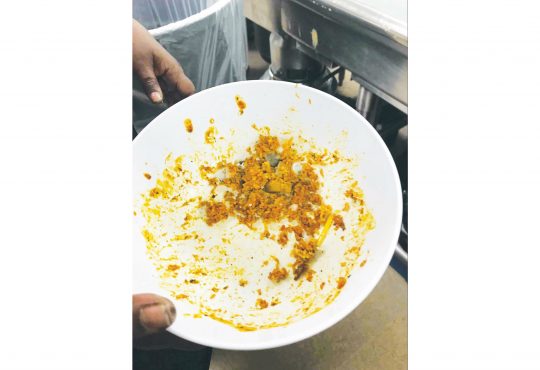After evaluating Puget Sound’s sustainability efforts in the past year, the Sustainability Advisory Committee (SAC) will be using the assessment to create short- and long-term priorities for university sustainability endeavors and goals, according to John Hickey, co-chair of the SAC.
The SAC hopes to have the new Center for Health Sciences building be LEED certified. According to www.usgbc.org, LEED (Leadership in Energy and Environmental Design) certified means that a building has been internationally recognized as a “green” building. Puget Sound currently has two LEED gold certified buildings: the Facilities Services Complex and the Live Green House. The University is also finishing decentralizing its central steam plant, which heats many of the campus’ buildings, and installing more efficient single building heating systems. This will reduce the University’s carbon footprint and save money, according to Hickey.
Hickey said that in the past year, the SAC focused on keeping track of the University’s “broad, significant sustainability endeavors,” such as curriculum and research, pilot sustainability projects, consumption, climate, outreach and planning and management. These endeavors are now being assessed through the national program STARS, or Sustainability Tracking, Assessment, and Rating System.
When asked why it is important for students to be informed and involved in sustainability efforts, Hicky responded, “This is critical for multiple reasons. First, students need to lead ongoing sustainability endeavors after they graduate. Being part of meaningfully engaging sustainbility at Puget Sound will enable them to be effective in their carreers and communities in addressing sustainability. Sustainability is of critical strategic importance on global, national, regional and local scales. All citizens should be informed and responsible for understanding and addressing sustainability challenges and opportunities.”
Hickey also mentioned how Puget Sound’s students are engaged in numerous and various ways. The SAC is an example in itself since students, faculty and staff constitute its members.
Hickey said, “This facilitates a comprehensive, prioritized approach to sustainbility at Puget Sound (unlike occurs at many other institutions where students, faculty and staff do not work closely together).”
Students may also participate in the Students for a Sustainable Campus (SSC), a club run by ASUPS. “SSC and the SAC work closely together as strong sustainbility partners,” said Hickey.
Other ways that students are involved are through participating in ongoing sustainability jobs, like recycling and carbon footprint monitoring and reporting, and taking courses across the University’s curriculum that involve sustainability, like in the Environmental Studies as well as other departments.
There is also a green advocate prgram to foster sustainability in residences and a Live Green House that is constructed of sustainable materials and systems, according to Hickey.
Also, students participate in various Puget Sound Civic Scholarship projects and in many co-curricular and independent local, regional and national sustainbility endeavors. According to Hickey, the SAC recently helped fund participation by several students in the April 2011 Power Shift Conference, which involved over 10,000 college and high school students from all over the country devoted to a sustainable future.
After evaluating Puget Sound’s sustainability efforts in the past year, the Sustainability Advisory Committee (SAC) will be using the assessment to create short- and long-term priorities for university sustainability endeavors and goals, according to John Hickey, co-chair of the SAC.
The SAC hopes to have the new Center for Health Sciences building be LEED certified. According to www.usgbc.org, LEED (Leadership in Energy and Environmental Design) certified means that a building has been internationally recognized as a “green” building. Puget Sound currently has two LEED gold certified buildings: the Facilities Services Complex and the Live Green House. The University is also finishing decentralizing its central steam plant, which heats many of the campus’ buildings, and installing more efficient single building heating systems. This will reduce the University’s carbon footprint and save money, according to Hickey.
Hickey said that in the past year, the SAC focused on keeping track of the University’s “broad, significant sustainability endeavors,” such as curriculum and research, pilot sustainability projects, consumption, climate, outreach and planning and management. These endeavors are now being assessed through the national program STARS, or Sustainability Tracking, Assessment, and Rating System.
When asked why it is important for students to be informed and involved in sustainability efforts, Hicky responded, “This is critical for multiple reasons. First, students need to lead ongoing sustainability endeavors after they graduate. Being part of meaningfully engaging sustainbility at Puget Sound will enable them to be effective in their carreers and communities in addressing sustainability. Sustainability is of critical strategic importance on global, national, regional and local scales. All citizens should be informed and responsible for understanding and addressing sustainability challenges and opportunities.”
Hickey also mentioned how Puget Sound’s students are engaged in numerous and various ways. The SAC is an example in itself since students, faculty and staff constitute its members.
Hickey said, “This facilitates a comprehensive, prioritized approach to sustainbility at Puget Sound (unlike occurs at many other institutions where students, faculty and staff do not work closely together).”
Students may also participate in the Students for a Sustainable Campus (SSC), a club run by ASUPS. “SSC and the SAC work closely together as strong sustainbility partners,” said Hickey.
Other ways that students are involved are through participating in ongoing sustainability jobs, like recycling and carbon footprint monitoring and reporting, and taking courses across the University’s curriculum that involve sustainability, like in the Environmental Studies as well as other departments.
There is also a green advocate prgram to foster sustainability in residences and a Live Green House that is constructed of sustainable materials and systems, according to Hickey.
Also, students participate in various Puget Sound Civic Scholarship projects and in many co-curricular and independent local, regional and national sustainbility endeavors. According to Hickey, the SAC recently helped fund participation by several students in the April 2011 Power Shift Conference, which involved over 10,000 college and high school students from all over the country devoted to a sustainable future.


